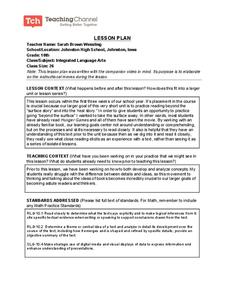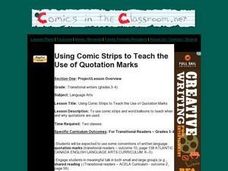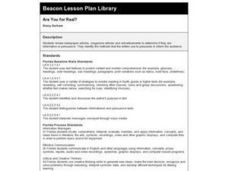Novelinks
Man's Search for Meaning: Problematic Situation
What are the three most important items for survival? Readers of Viktor Frankl's Man's Search for Meaning, ponder this question individually and share their list with a group, that must then reach consensus on the three most important...
Teaching Channel
Storyboard Lesson Plan
Good books are accessible through a variety of literary lenses. To consider how the same story can be seen in different lights, groups develop a storyboard for a movie teaser that would focus on one of six concepts found in Suzanne...
EngageNY
Launching the Module: Quotes about the Middle Ages
Pick a corner. Scholars receive a quote about the Middle Ages and then participate in a four corners activity by choosing a corner pertaining to their quotes. They then work in groups of three to discuss the bold words in their quotes....
Curated OER
Tangerine: Anticipation Guide
Encourage your readers to make predictions about Edward Bloor's young adult novel, Tangerine, with an anticipation guide that presents statements that introduce key issues in the novel.
Curated OER
Treaties- Grade 9
Students discover historical and current issues regarding First Nations Treaties. In this Canadian history lesson, students read and analyze treaties made between the Canadian government and the native people of the land. Students...
Curated OER
Animal Communication
Students use three nonfiction selections in order to investigate the concept of animal communication. They use a graphic organizer for the information as it is gathered in the reading.
Curated OER
Story Setting - The Art Lesson by Tomi dePaola
Students read the book The Art Lesson by Tomi dePaola and analyze the story. In this setting lesson, students discuss the importance of the setting and how it helps us understand the story. Students answer questions and chart their...
Curated OER
Using Comic Strips to Teach the Use of Quotation Marks
Students identify when and why quotations are used. Using comic strips and speech bubbles, they read and discuss examples of quotation marks, and in pairs write text for a cartoon on a piece of paper using quotation marks around the...
Curated OER
Patriotic Songs
First graders recognize patriotic songs of America. In this historical music lesson, 1st graders discuss the historical background of the song "Yankee Doodle" and repeat the lyrics after the instructor. Students read the lyrics to the...
Curated OER
The Adventures of Tom Sawyer: Problematic Situation
Present your pupils with some moral dilemmas to examine. The scenarios, which learners rank by seriousness individually and then in groups, require learners to think about right and wrong.
Curated OER
Parrot in the Oven: Letter to a Character
Readers of Parrot in the Oven: Mi Vida place themselves in the story and craft a persuasive letter to a character in Victor Martinez's National Book Award-winning novel.
Curated OER
Lilly's Purple Plastic Purse: Kevin Henkes
Kevin Henkes has composed a series of books in which Lilly the mouse is a main character. Third graders use illustrations and key details as they compare and contrast the books, Lilly's Purple Plastic Purse and another story staring the...
Curated OER
The Wind Blew
Students look at a picture book and observe what the facial expressions show. For this character's feelings lesson, students write what they think the character might be saying on each page and the punctuation they use. Students draw...
Curated OER
Are You For Real?
Students try to find newspaper and magazine articles that are informative or persuasive. They practice determining the differences between the two types of articles. They identify the devices authors use to persuade the audience.















